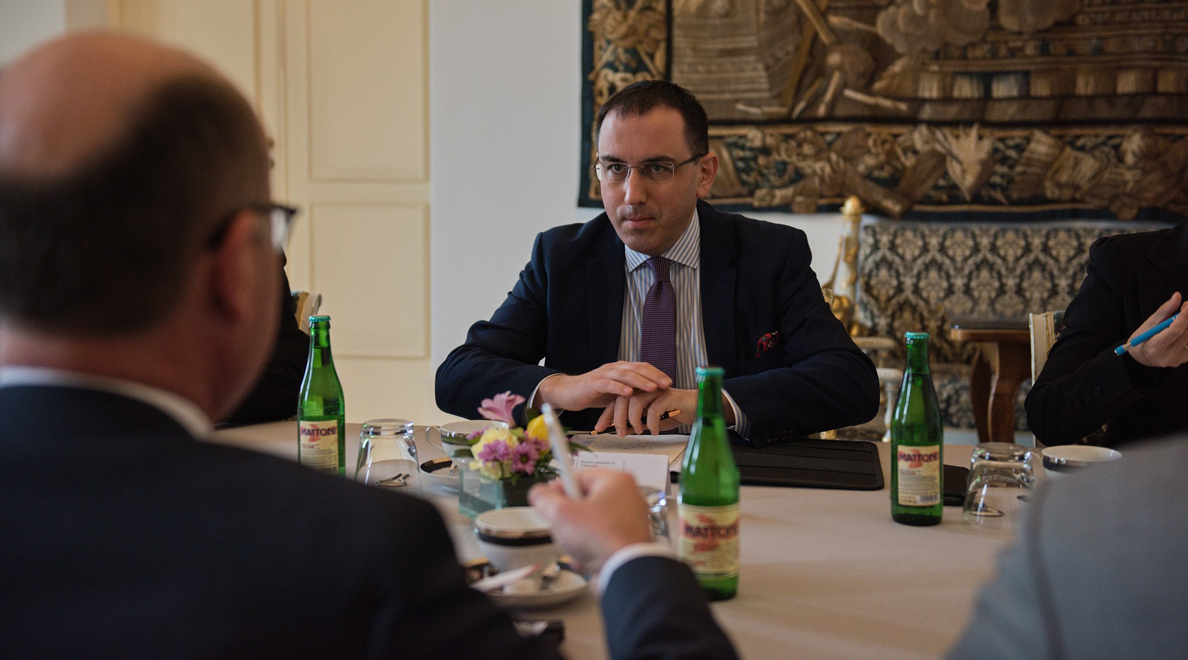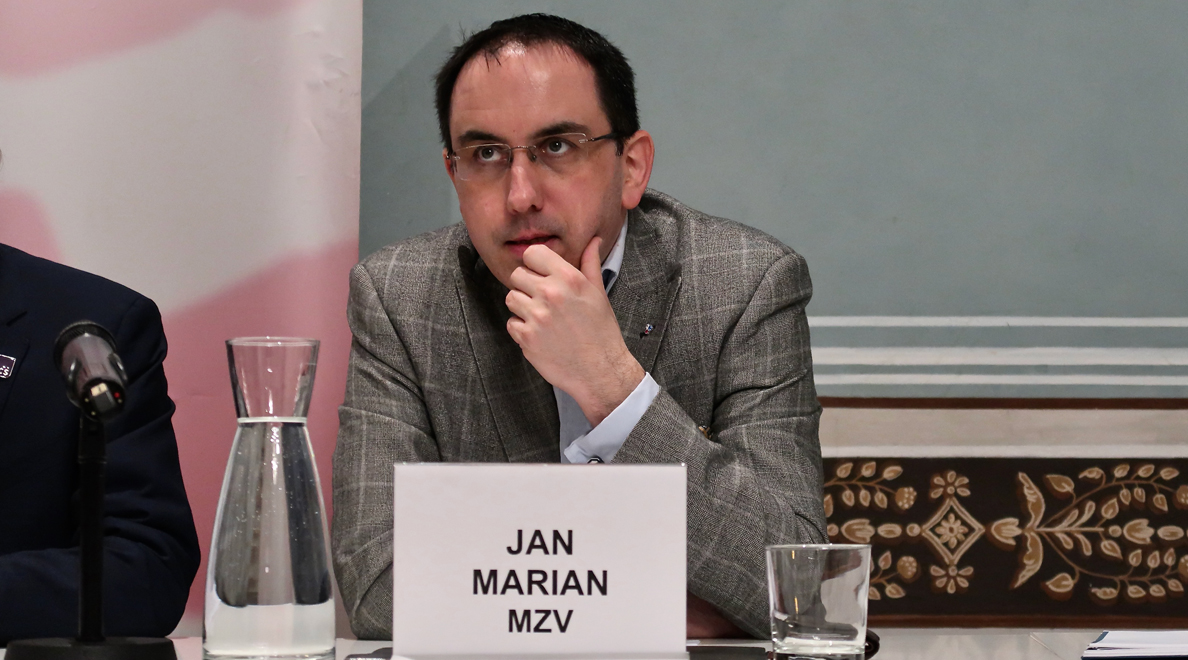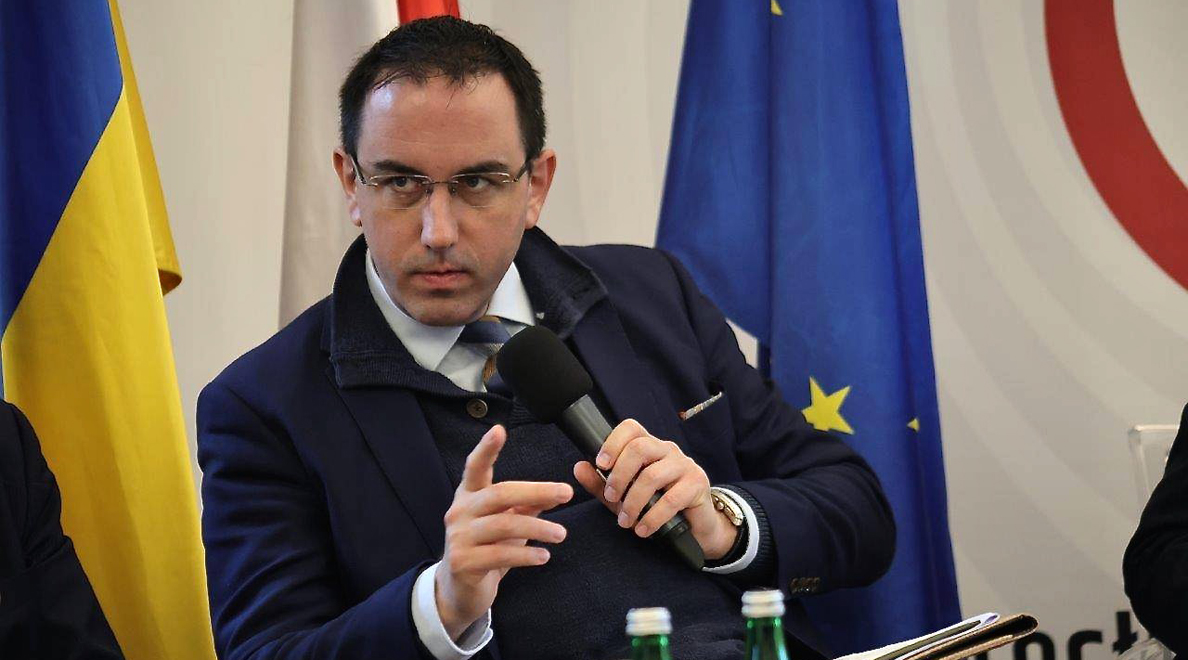From the very beginning of the war, the Czech Republic has been one of the most sincere and loyal partners of Ukraine in its fight against Russian aggression. Czechia looked through its stockpiles of weapons and delivered everything it could, and the plan of the government and the president of the republic to purchase ammunition for the Ukrainian Armed Forces is known throughout the world as the "Czech initiative." Prague actively defends Ukraine's right to be a member of Euro-Atlantic structures on all international platforms. Let's not forget about the huge number of refugees to whom the Czech Republic has granted asylum - almost 4% of the total number of its own population.
The Ministry of Foreign Affairs of the Czech Republic plays a significant role in everything related to assistance to Ukraine. In an interview with Ukrinform, Deputy Foreign Minister Jan Marian spoke about numerous events that focus on support for Ukraine, as well as projects in which the ministry is directly involved. We started with the Peace Summit, participation in which was confirmed by President Petr Pavel.

WIDE PRESENCE AT THE SUMMIT IS A STEP FORWARD TOWARDS LASTING PEACE IN UKRAINE
- In less than a month, on June 15-16, the Global Peace Summit on Ukraine is about to take place in Switzerland. You represented the Czech Republic at one of the "preparatory" meetings, in Jeddah. What, in your opinion, should we expect from the summit?
- We expect from this summit a further demonstration and confirmation of the international community's support for the principles of international law that Russia has so bluntly violated when starting the aggression against Ukraine. We believe that most of the international community could unite itself around the international law principles that are embedded in the UN Charter. The wide presence at the summit could then be viewed as a step forward towards a lasting and just peace in Ukraine.
It is equally important and necessary to talk to our global partners, countries like BRICS and other so-called Global South partners and explain to them the core of the Russian aggression and the ways how it undermines international order and stability.
It is also in their interest to find a lasting and just peace solution because Russia's aggression has far-reaching global consequences (food and energy security, nuclear safety and security).
- Czechia, along with France, Japan and Sweden, chairs the working group on nuclear and radiation safety in the framework of President Zelensky's 10-point peace plan. Last month the Ministry of Foreign Affairs of Czechia hosted a working meeting on the issue. Who was present and what results were achieved at that meeting?
- We hosted 26 delegations of individual countries and international organizations. More than 70 participants, both experts and diplomats, were present at the WG1 (Radiation and Nuclear Safety) meeting in Prague.
We hosted also a high-level delegation from Ukraine that included Minister of Energy German Galushchenko, Deputy Minister Svitlana Hrynchuk, Director of Nuclear and Radiation Safety of Energoatom Oleksandr Depenchuk.
The main outcomes of the workshop focused on the ways how to foster nuclear safety and security of Ukrainian nuclear power plants and on possible international assistance in this area.
For example, there are currently two programs being developed by Ukraine, which focus on restoring the regular operation of the (Russian-occupied) Zaporizhzhia Nuclear Power Plant (ZNPP). The participants expressed broad agreement that elaborating a detailed plan of technical steps for ZNPP re-launch would be helpful, covering the process step-by-step, and also allocating expertise, resources and international assistance necessary for its implementation.
CZECHIA SUPPORTS UKRAINE'S FUTURE MEMBERSHIP IN NATO
- On May 30-31, 2024 Prague will host an informal meeting of the North Atlantic Council (NAC) at the level of Ministers of Foreign Affairs. What is Czechia's position on the issue of Ukraine's NATO membership?
- Czechia supports the future membership of Ukraine in NATO as the ultimate security guarantee for Ukraine. At the Vilnius summit, we agreed on a strong package of political and practical support for Ukraine. And we are pleased that NATO reaffirmed that Ukraine will become a member of NATO when conditions are met. We believe that the upcoming NATO summit in Washington will further bolster our support and help Ukraine prepare for NATO membership.
- This year's GLOBSEC Forum will take place in Prague from August 30 to September 1, 2024. You put your signature on the Memorandum of Understanding on cooperation in the preparation of it. One of the announced themes of the Forum is support for Ukraine. Who is invited to the event and what aspects of support will be discussed?
- It is true. Support for Ukrainians defending their country against Russia will be the leading topic of the Globsec Forum in Prague. The Russian aggression against Ukraine has had a tremendous impact on global stability and security. We cannot afford Ukraine to lose this war. The consequences would be disastrous for Europe and the world.
President Pavel directly invited President Zelensky to participate in the Forum. The Ukrainian Minister of Defense and other representatives of the Ukrainian government are also invited.
The Globsec Forum is a truly global event, with many Heads of State, Heads of Government, Ministers of Foreign Affairs and Ministers of Defense from a wide range of regions. While the majority represent the EU and NATO countries, we also have the honor of inviting leaders from Eastern Europe, the Balkans, the Middle East, and even Asia. Notable attendees include NATO General Secretary Jens Stoltenberg and European Commission President Ursula von der Leyen.
I believe we will succeed with the Globsec think tank to create the right momentum at the Forum and ensure further support for Ukraine that will match the needs in the best possible way.

FOREIGN MINISTER TO LEAD CZECH DELEGATION AT UKRAINE RECOVERY CONFERENCE
- Who will represent Czechia at the Ukraine Recovery Conference in Berlin in June?
- The delegation to the URC in Berlin will be led by Foreign Minister Jan Lipavský.
Preparations for the conference and communication with the organizers are currently underway. At the same time, Czechia is interested in having as many representatives of its private and non-profit sectors as possible.
- The Czech ammunition initiative has gained wide recognition. What role does the MFA play in it, if any?
- As Ukraine is fighting bravely, it needs immediate and effective military aid. Therefore, Czechia and other Allies continue to deliver weapons, ammunition and equipment to Ukraine and help train Ukrainian forces.
The Czech initiative helps procure ammunition from third countries in a situation when European, including Ukrainian, defense industry capacities are still expanding.
Our MFA plays a supportive role in this endeavor.
CZECH PATRONAGE OF DNIPROPETROVSK REGION - AREA OF SPECIAL INTEREST
- There were reports that Prague agreed with Kyiv last year to open its diplomatic office in the city of Dnipro, which Czechia wants to take under the patronage for the post-war reconstruction. Is there any development in this regard?
- Czechia has an intensive program of cooperation with the Dnipropetrovsk region. To open a diplomatic mission in Dnipro is a logical step in the direction of deepening it. We are already making steps in this direction.
At the moment, a special diplomatic post at the embassy in Kyiv has been created - a special diplomat for Dnipro. This position has been filled since the summer of last year. The next step will be to establish an Embassy office in Dnipro. These steps will lead to the establishment of a full-fledged Consulate General in the future, as soon as the situation allows.
While it is not possible to consider the full reconstruction of the country until the conflict is over, it is undeniably possible to express a specific interest in the reconstruction through the selection of a specific area. The conceptual approach can be better coordinated this way.
The selection of the Dnipropetrovsk region as a Czech priority for reconstruction has significantly strengthened the position of Czechia and Czech companies in the region. However, the choice of one region does not mean that Czech companies and public institutions cannot be involved in projects in the rest of the country, just as Czechia's humanitarian and development assistance is also focused on other Ukrainian regions.
The Czech patronage of the Dnipropetrovsk region could thus be described as an area of special interest rather than an area of exclusive Czech attention. This area of special interest should be concretely reflected in the implementation of bilateral projects.
Furthermore, special consideration of the Dnipropetrovsk region should be given when implementing projects under the Humanitarian, Reconstruction, Stabilization and Economic Assistance Program to Ukraine 2023 - 2025 (Program Ukraine).
All ministries in charge of implementing individual chapters of the program should first take into account the suitability and feasibility of implementing such projects in the Dnipropetrovsk region when evaluating project proposals.
In the case of projects already implemented elsewhere, consideration should be given to their extension to the Dnipropetrovsk region (e.g. Czech MEDEVAC projects in Western Ukraine).

CZECHIA WANTS COORDINATED APPROACH WITH EU ON UKRAINIAN MILITARY-AGE MEN ABROAD
- The Ministry of Foreign Affairs of Czechia is known for its very concrete support for Ukraine. For example, at the end of last year, the Ministry of Foreign Affairs undertook to provide a monetary contribution of 3 million crowns intended to ensure the transport of 25 trams to Ukrainian Konotop. What other initiatives could be mentioned?
- Czechia supports the agreed framework for EU security commitments to Ukraine. Czech Government has prepared a special Humanitarian, stabilization, reconstruction and economic assistance program for Ukraine 2023-2025 that includes a wider region (especially Moldova and Georgia). We provide humanitarian assistance to Ukraine through in-kind inputs and material support to enable people to access healthcare, water management and sanitation, care for war veterans and socially vulnerable groups of population, drinking water, electricity and heating or shelters for internally displaced people in Ukraine and Ukrainian refugees in neighboring countries.
In addition to the delivery of 25 trams to Ukraine that you mentioned, among the most significant cases (ongoing or being prepared) are, for example, the contribution to humanitarian demining of agricultural areas affected by the war and the contribution to World Food Program - transport of Ukrainian grain to specific African countries. This list also includes the contribution to technical equipment of the training center and dormitory in the city of Dnipro - Center of Vocational and Technical Education Dnipro; equipment of the Kharkiv Perinatal Center, operating theaters of the Volyn Regional Hospital; equipment of the surgeries of general medicine, gynaecology and surgery - Marhanets Hospital, maternity hospital equipment in the city of Lviv; and deliveries of mobile water treatment plants to Ukrainian regions affected by water shortage.
- There is a big discussion going on in Ukraine and in the European countries with the large number of Ukrainian refugees concerning men aged 18 to 60. Ukraine would like to have them back. Does your ministry participate in the debate?
- Yes, MFA and its counterparts, mainly Ministry of Interior, is participating in the ongoing debate on the situation of the Ukrainian citizens in Czechia who fall under the conditions of the new law on mobilization. We aim to reach a coordinated approach with other EU/Schengen countries in this regard.
Olga Tanasiichuk, Prague
Photos provided by the Ministry of Foreign Affairs of the Czech Republic
